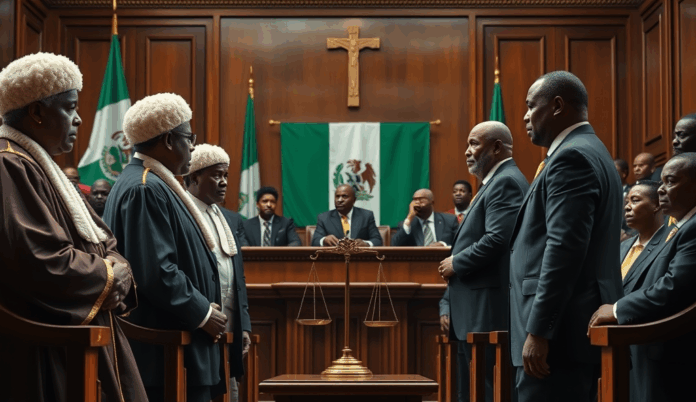Introduction to Judiciary Independence in Nigeria
Judiciary independence in Nigeria forms the cornerstone of democratic governance, ensuring impartial adjudication free from executive or legislative influence. The 1999 Constitution establishes this principle through structural safeguards, though practical challenges persist, as seen in the 2016 controversial arrests of judges by the DSS.
Historical precedents like the 1983 judicial purge under military rule highlight vulnerabilities when judicial autonomy is compromised. Recent reforms, including the Financial Autonomy Act 2020, aim to strengthen institutional resilience against political interference.
Understanding these dynamics sets the stage for examining constitutional provisions that protect judicial autonomy, which we’ll explore next. This framework remains critical for legal professionals navigating Nigeria’s evolving rule of law landscape.
Key Statistics

Constitutional Provisions Safeguarding Judiciary Independence
Judiciary independence in Nigeria forms the cornerstone of democratic governance ensuring impartial adjudication free from executive or legislative influence.
The 1999 Constitution (as amended) enshrines judicial independence through Sections 4(8), 6, and 17(2)(e), creating structural barriers against executive interference while mandating separation of powers. Notably, Section 292 establishes security of tenure for judges, requiring legislative approval for removals—a safeguard tested during the 2020 Supreme Court crisis involving Justice Walter Onnoghen’s controversial suspension.
Financial autonomy provisions in Section 81(3) and the Third Schedule empower the National Judicial Council (NJC) to manage judiciary budgets, though implementation gaps persist as seen in the 2022 nationwide judicial workers’ strike over unpaid allocations. These constitutional safeguards align with global standards like the UN Basic Principles on Judicial Independence but face localized enforcement challenges.
The next section examines how the NJC operationalizes these constitutional protections through disciplinary oversight and appointment processes, highlighting its pivotal role in maintaining judicial autonomy amidst political pressures. This interplay between constitutional theory and institutional practice remains vital for legal professionals interpreting Nigeria’s evolving jurisprudence.
Role of the National Judicial Council (NJC)
The 1999 Constitution enshrines judicial independence through Sections 4(8) 6 and 17(2)(e) creating structural barriers against executive interference while mandating separation of powers.
The NJC serves as the operational backbone for judicial independence in Nigeria, exercising constitutional powers under Sections 153 and 158 to appoint, discipline, and recommend judges for removal—a critical check against executive overreach demonstrated during the 2020 Onnoghen case. Its 23-member composition, led by the Chief Justice of Nigeria, blends judicial and non-judicial stakeholders to balance accountability with autonomy.
Recent NJC disciplinary actions, like the 2023 suspension of two judges over misconduct allegations, showcase its enforcement role despite political pressures. The council’s appointment processes also face scrutiny, as seen in the delayed confirmation of Justice Monica Dongban-Mensem as Court of Appeal President due to legislative-executive disputes.
These functions directly impact judiciary funding—a natural segue into examining financial autonomy challenges under Section 81(3), where NJC’s budgetary oversight often clashes with executive implementation delays.
Financial Autonomy of the Judiciary
The NJC serves as the operational backbone for judicial independence in Nigeria exercising constitutional powers under Sections 153 and 158 to appoint discipline and recommend judges for removal.
Section 81(3) of Nigeria’s Constitution mandates direct funding for the judiciary, yet persistent delays in fund releases—like the 2022 ₦120 billion budget shortfall—undermine this autonomy. The NJC’s oversight role often clashes with executive bottlenecks, as seen when state judiciaries faced salary arrears despite federal allocations.
Judicial independence suffers when courts rely on executive-controlled disbursements, exemplified by the 2021 strike by JUSUN workers protesting underfunding. Such financial constraints compromise efficiency, with 43% of judges reporting delayed case hearings due to resource shortages in a 2023 NBA survey.
These funding gaps directly impact judicial officers’ stability, setting the stage for examining tenure security under Section 292—where financial pressures intersect with removal safeguards.
Security of Tenure for Judicial Officers
Section 81(3) of Nigeria’s Constitution mandates direct funding for the judiciary yet persistent delays in fund releases undermine this autonomy.
Section 292 of Nigeria’s Constitution provides robust tenure protection, requiring judicial officers’ removal only through strict procedures involving misconduct proofs and two-thirds legislative approval. Despite this, executive interference persists, as seen in 2020 when the NJC controversially recommended Justice Walter Onnoghen’s suspension over asset declaration issues, raising concerns about politically motivated removals.
Financial instability exacerbates tenure vulnerabilities, with delayed salaries and budget shortfalls weakening judicial officers’ resistance to external pressures. A 2023 NBA report revealed 28% of magistrates feared arbitrary transfers or dismissals when ruling against government interests, highlighting how funding gaps indirectly threaten constitutional safeguards.
These tenure challenges create a precarious environment where judicial independence intersects with accountability, setting the stage for examining judicial immunity’s role in balancing protection against abuse.
Judicial Immunity and Its Limits
Nigeria’s judiciary independence challenges mirror trends in Pakistan and Kenya where executive interference in high-profile cases has eroded public trust.
While judicial immunity shields Nigerian judges from lawsuits for official acts, its scope remains contentious, particularly when accountability concerns arise from cases like Justice Onnoghen’s suspension. The 1999 Constitution balances this protection under Section 308, yet recent NJC disciplinary actions reveal gaps where immunity may inadvertently shield misconduct.
A 2022 CJN report showed 14% of judicial officers faced petitions alleging abuse of immunity, often tied to politically sensitive rulings. This tension between protection and accountability underscores why reforms must clarify immunity’s boundaries without eroding judicial autonomy.
As Nigeria grapples with these limits, the interplay between immunity and independence sets the stage for examining systemic challenges to judiciary independence. Financial pressures and executive interference further complicate this delicate equilibrium.
Challenges to Judiciary Independence in Nigeria
Beyond immunity debates, chronic underfunding remains a critical threat to judicial autonomy, with the judiciary receiving just 1.2% of Nigeria’s 2023 national budget despite handling over 150,000 pending cases. This financial strain creates dependency on executive-controlled allocations, potentially influencing judicial outcomes in high-profile political cases.
Executive overreach manifests through delayed judicial appointments and selective enforcement of NJC recommendations, as seen when 8 state governors between 2015-2022 ignored court orders on local government autonomy. Such interference erodes public trust, with Afrobarometer data showing only 34% of Nigerians believe courts can resist government pressure.
These systemic pressures directly impact case outcomes, setting the stage for examining landmark rulings that tested judiciary independence. The controversial handling of election petitions in 2019 and 2023 particularly highlights this vulnerability, revealing patterns worth analyzing through specific case studies.
Case Studies Highlighting Judiciary Independence
The 2019 Zamfara election case exemplifies executive interference, where the Supreme Court controversially voided APC’s victories days after the presidency allegedly pressured judicial officers, raising concerns about judicial autonomy in Nigeria. Similarly, the 2023 Kano governorship appeal saw conflicting court orders from parallel benches, exposing vulnerabilities in Nigeria’s judiciary independence under political pressure.
Analysis of the Imo State 2020 governorship judgment reveals inconsistencies in electoral jurisprudence, with legal scholars noting the Supreme Court’s decision contradicted established electoral guidelines without clear constitutional justification. These cases demonstrate how executive influence and funding constraints discussed earlier manifest in controversial rulings that undermine public trust.
The ongoing trial of suspended CBN governor Godwin Emefiele further tests judiciary independence, with prolonged detention despite court-ordered bail highlighting executive disregard for judicial authority. Such precedents create a troubling pattern that comparative analysis with other jurisdictions will later examine for systemic solutions.
Comparative Analysis with Other Jurisdictions
Nigeria’s judiciary independence challenges mirror trends in Pakistan and Kenya, where executive interference in high-profile cases has eroded public trust, though Kenya’s 2010 constitutional reforms introduced stricter safeguards for judicial autonomy. Unlike Nigeria’s underfunded judiciary, South Africa allocates 1% of its national budget to courts, insulating judges from financial pressures that often enable political manipulation.
India’s collegium system, though imperfect, offers lessons for Nigeria by decentralizing judicial appointments from executive control, reducing incidents like the Zamfara and Kano controversies. Ghana’s Judicial Council similarly shields judges from direct executive influence, demonstrating how structural reforms can mitigate the funding constraints and political pressures plaguing Nigeria’s judiciary.
These comparative insights highlight actionable models for Nigeria, setting the stage for targeted recommendations to strengthen judicial independence. Examining these jurisdictions underscores that constitutional safeguards alone are insufficient without enforceable mechanisms to curb executive overreach, a gap Nigeria must address urgently.
Recommendations for Strengthening Judiciary Independence
Nigeria should adopt Kenya’s model of constitutional reforms to insulate judicial appointments from executive interference, while mirroring South Africa’s budget allocation of 1% GDP to courts, addressing the chronic underfunding that enables political manipulation. Establishing an independent judicial council like Ghana’s would decentralize appointment powers, reducing incidents like the Zamfara and Kano controversies where executive influence undermined rulings.
The National Judicial Council’s disciplinary powers must be strengthened to match India’s collegium system, ensuring transparent sanctions for judicial misconduct without executive interference. Legislative amendments should enforce financial autonomy for courts, mandating direct budget releases from the federation account to prevent funding delays used as leverage over judges.
These structural changes must be paired with public accountability measures, including live-streamed high-profile cases to rebuild trust eroded by perceived executive overreach. Such reforms would align Nigeria’s judiciary with global best practices while addressing localized challenges highlighted in earlier sections.
Conclusion on Judiciary Independence in Nigeria
The Nigerian Constitution provides robust safeguards for judicial autonomy, yet persistent executive interference and funding challenges undermine its effectiveness. Recent cases like the controversial removal of former Chief Justice Walter Onnoghen highlight the fragility of these protections despite constitutional provisions.
Judicial reforms must address systemic issues, including inadequate funding and political pressures, to strengthen the rule of law in Nigeria. The 2022 NJC report revealed that 60% of judicial officers cited executive influence as a major threat to their independence.
Moving forward, sustained advocacy and institutional safeguards are crucial to preserve judiciary independence as a cornerstone of Nigeria’s democracy. Legal professionals must remain vigilant against encroachments while pushing for reforms that reinforce constitutional protections.
Frequently Asked Questions
How can Nigerian legal professionals challenge executive interference in judicial appointments?
File preemptive suits at the Federal High Court citing Section 292 constitutional violations and leverage NJC's disciplinary powers to document irregularities.
What practical steps can judges take to safeguard against politically motivated removals?
Maintain meticulous records of all rulings and asset declarations while promptly reporting any executive pressure to the NJC's Judicial Integrity Committee.
How can lawyers address delayed judiciary funding without compromising independence?
Use Freedom of Information requests to track budget allocations and partner with CSOs like SERAP to file enforcement suits for Section 81(3) compliance.
What tools exist to monitor violations of judicial immunity in high-profile cases?
Access the NJC's public disciplinary portal and utilize the NBA's Judicial Integrity Group database to track patterns of executive overreach.
Can magistrates resist arbitrary transfers linked to unfavorable rulings?
Yes by invoking Section 36 fair hearing rights through immediate appeals to the Judicial Service Commission with documented evidence of punitive transfers.


